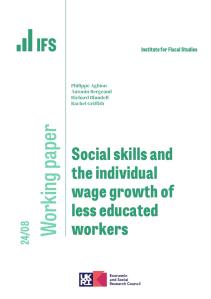This paper estimates the causal effects of family size on girls’ education in Mexico, exploiting prenatal son preference as a source of random variation in the propensity to have more children within an instrumental variables framework. It finds no evidence of family size having an adverse effect on education. The paper then weakens the identification assumption and allows for the possibility that the instrument is invalid. It finds that the effects of family size on girls’ schooling remain extremely modest at most. Families that are relatively large compensate for reduced per-child resources by increasing maternal labour supply.
This article is related to the working paper Empirically probing the quantity-quality model.
Authors

Research Fellow University College London
Emla Fitzsimons is a Professor of Economics at the University College London Institute of Education and a Research Fellow at the IFS.

Research Fellow University of Kent
Bansi is a Research Fellow of the IFS, a Senior Lecturer of Economics at the University of Kent and also a Fellow at the Global Labor Organisation.
Journal article details
- DOI
- 10.1007/s00148-013-0474-8
- Publisher
- Springer
- ISSN
- 1432-1475
- JEL
- I20, J13, J16
- Issue
- July 2013
Suggested citation
Fitzsimons, E and Malde, B. (2013). 'Empirically probing the quantity–quality model' (2013)
More from IFS
Understand this issue

Behind the numbers: reassessing investment in skills and training
12 October 2023

If you can’t see it, you can’t be it: role models influence female junior doctors’ choice of medical specialty
24 April 2024

Retirement is not always a choice that workers can afford to make
6 November 2023
Policy analysis

Progression of nurses within the NHS
12 April 2024

Regional variation in earnings and the retention of NHS staff in Agenda for Change bands 1 to 4
10 April 2024

Recent trends in public sector pay
26 March 2024
Academic research

Social skills and the individual wage growth of less educated workers
27 March 2024

Labour market inequality and the changing life cycle profile of male and female wages
15 April 2024

Interpreting cohort profiles of lifecycle earnings volatility
15 April 2024